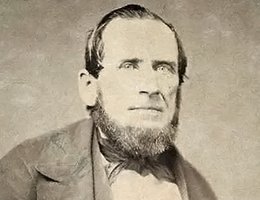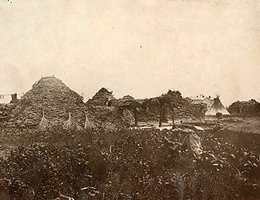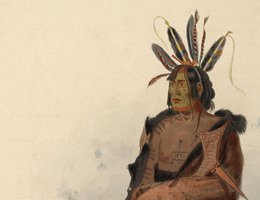

John Dunbar and Samuel Allis were perhaps the most adventurous of the early missionaries to Nebraska. They accompanied Indian Agent John Dougherty to his Indian agency at Bellevue in 1834. Dougherty distributed annuity goods to the Pawnees as prescribed by the Treaty of 1833. He explained to the chiefs of the four bands of Pawnee the reasons for the presence of Dunbar and Allis. The Pawnee immediately invited the two men to travel with them on the coming winter buffalo hunt. Big Ax, chief of the Loup band, told the missionaries,
"I love the whiteman; the whiteman can not cry in the prairie but I will be there to assist him. I want to know something of the great religion which you have among you; and if any of those people who come to teach us about the Great Spirit, and how to write, will come to my lodge I will see that they shall be neither cold nor hungry."

Then Shah-re-tah-riche, chief of the Grand band, also asked that a missionary accompany him. Both missionaries had reservations about being separated for such a long time, but they decided to "trust in the lord and go forward." On October 19, they left Bellevue with their new guardians, Dunbar with the Grands and Allis with the Loup. For the next five months their lives would depend upon people whom they categorized as "savages."
Dunbar was the guest of Shon-gah-kah-he-gah, the second chief of the Grands. The place of honor had been reserved for a trader who was the guest of the first chief. Allis was the guest of the Loup chief, Big Ax.
Dunbar kept a detailed journal of the various events ranging from everyday occurrences to sacred ceremonies. The writings also revealed much about Dunbar himself. His compassion for others is abundantly evident, but his descriptions also leave no doubt of his disdain for any custom different from those he practiced. For example, he was outraged when the Indian women came to unsaddle the men’s horses. His horse still skittish around these strangers, shied away from the women, and Dunbar concluded that his horse had "a more just sense of propriety in that respect than the Pawnees." He unsaddled the horse himself, probably never considering the embarrassment this caused the women.

Allis’ writings revealed a more pragmatic individual. He too discussed the alien customs of the Pawnee but with little condemnation. He, however, was not afraid to express his opinion. He did not have a high regard for the Arikara, distant cousins of the Loup, who were traveling with the Pawnee hunting party. He described how the Arikara dashed ahead of the Loup and scattered the buffalo. No doubt Allis had been told earlier about the Arikara’s recent attacks on fur traders for he concluded the Arikara were so treacherous that they would be "no other way to stop them than to kill them off."
Allis, no doubt, shocked the American Board of Commissioners for Foreign Missions by suggesting,
"...that a Missionary that was going among the wandering tribes, would in some cases be more useful to marry one of their women, than to live a single life ... a man married to one of there women would have many advantages over a single man, and I think would have more influence."
The American Board became concerned about the missionaries spending too much time with the Pawnee on their winter and summer hunts and not establishing a permanent mission station. The missionaries assured the Board that the time traveling with the Pawnee was well spent as it gave them an opportunity to learn the Pawnee language and gain an understanding of the "Indian character." Both men felt knowledge of the Pawnee language was very important in trying to preach the truth to the Indians. Reliance on interpreters was too likely to lead to misunderstandings. Dunbar and Allis also thought that before Indians could acquire any more than the rudiments of Presbyterianism, "they ought to be tought [taught] the art of civelization, and to cultivate the soil."
Thus, the missionaries aligned themselves with those who believed conversion to Christianity could not occur until the Indians rejected their traditional lifestyle and at least began to dress and act like solid New England farmers. Those who opposed this view argued that the first duty of the missionary was to convert the non-Christian because "civilization" was an outgrowth of Christianity.
Dunbar and Allis expressed confidence in Christianizing the Pawnee and indicated they felt safe under the protection of the Indians. Allis express his optimism by stating, "Although the progress is slow I hope to see them in my day enquireing what they shall do to be saved."